Mini-Book Reviews
Some new, some old. Some in progress, some finished. Some repeats, some originals.
Greatest Essayist Alive
If you haven't read a collection of Joseph Epstein essays, you're unenlightened or you've been deprived or you have a life outside of literary pursuits. Hopefully, the latter, but if you fear it's because you fall into either of the first two categories, buy a collection of essays now. I have seven such books, and I like them all. Once More Around the Block is my favorite, but I also highly recommend The Middle of My Tether and Familiar Territory. Epstein is erudite, humorous, and a top-flight writer. Anecdotes fly out of his pen faster than insults from Don Rickles.
Quick example: In an essay (link to part of essay) about NYC, he notes that Jan Morris of Rolling Stone wrote in the late 1970s/early 1980s that people think New York reached its zenith during the 1930s and 1940s and was decrepit now, but Epstein then rattles off four other writers who thought New York had peaked decades earlier (when the writers were young) but was now finished (when the writers were older): Edith Wharton (NYC special in 1880s, but finished by 1906), Theodore Dreiser (good in 1920s but not later), F. Scott Fitzgerald (good in 1920s; finished by 1932), Saul Bellow (good in 1940s, bad by 1970s).
I guess there's a chance Epstein found all five of those examples in one spot, but I doubt it. Having read well over a thousand pages of his prose, I'm confident he culled those from his literary memory and reading notes. A very impressive individual, yes.
Aside: If you're a non-fiction reader looking for light vacation reading, a collection of Epstein essays is a perfect fit.
Total Pages of Text: 308. My Progress: Finished. Rating: 10. Index, Bibliography, Footnotes: None.
"An Absolute Classic"
That's what Benedict Groeschel called it: an absolute classic. He said he first read it at age 16, and has read it many times since (I think he said he's read it every year of his life since 16). I figured, "With an endorsement like that, I gotta get it."
I wasn't disappointed, though I think the author could've hacked out about one-fifth of the text without losing anything (which is saying a lot, since it's already a short book). The book's thrust: Sainthood is easy. Just lose all inclination to complain. "[H]oliness means the eager acceptance of every trial sent . . . by God. . . It is the philosophers' stone that changes into gold all their worries, all their troubles, all their sufferings. . . [A] soul abandoned to God . . . should never complain."
"Whatta bunch of crap," I thought to myself.
Just kidding. In fact, just the opposite went through my mind: if eager acceptance and a lack of complaining is the mark of holiness, what does that say about (ahem) those who don't accept and tend to complain? It was discomforting, to say the least, and I'll just leave it at that.
In any event, a great book. Highly recommended.
Image edition. Total Pages of Text: 119. My Progress: Finished. Rating: 9.5 (could've been written in 90 pages). Index, Bibliography, Footnotes: None.
Thomas E. Woods, Jr., Meltdown (Regnery, 2009). This is a primer, and a much-needed one. If you think government public works can get us out of our economic problems, read this book. If you think the greed of the free market (as opposed to the greed of the government-subsidized financial sector) got us into this problem, read this book. If you don't understand why the Panic of '29 turned into The Great Depression, read this book. If you want to understand that (today, overlooked) school of economic thought known as "Austrian," the only school to see this coming, read this book. If you have friends that think Obama can fix this mess, or even friends who think it's his fault, buy them copies of this book. Highly recommended for someone just wading into these waters.
Total Pages of Text: 163. My Progress: 110. Rating: 8. Index: A. Bibliography: None, but plenty of reference materials in the footnotes.
__________
Walter A. McDougall, Freedom Just Around the Corner (Perennial HarperCollins, 2005). Volume One of a trilogy. I just finished this one, and it's great. The second volume was released in paperback a few weeks ago. I started it last weekend. I'll post something about it later as I make progress.
This first volume is packed with facts and anecdotes, is very well-written, hits American history from all angles: militarily, politically, economically, culturally. You'll learn highly interesting things you never knew but should have, like this:
Nor was slavery a whites-only privilege. By 1830 more than two hundred Cherokees owned slaves. So did 3,775 free blacks. Finally, Louisiana mulattoes with French or Spanish names might acquire plantations hoping for acceptances as 'whites.' At least a tenth of all masters were women who inherited slaves from husbands or fathers.
And this tidbit about settling the area west of the Appalachians and east of the Mississippi:
[Federal land agents] bought choice parcels themselves or took kickbacks for sharing intelligence. To be sure, a land agent's life in frontier exile was rough, hectic, and tense. He might confront riots and threats. His paperwork backed up for months or years. But his was lucrative, powerful post, to which only the well-connected won appointment.
Total Pages of Text: 513. My Progress: Finished. Final Rating: 9. Index: A-. Bibliography: None, but the footnotes are packed with references and additional material.
__________
Mike Aquilina, The Way of the Fathers (Our Sunday Visitor, 2000). When I became a father, I came to love reading in short bites: lists, anecdotes, aphorisms, quote books, whatever I could read quickly before the next baby screech or chauffer duty. I assembled a small library of such books, then I got this book two years ago. It's probably my favorite (though The Quotable Chesterton is also right up there, but it's out of print). If you're looking for bits of wisdom in 12-second increment, you want this book.
Total Pages of Text: 205. My Progress: Don't know, I've just been jumping around it. Footnotes, bibliography, index: Not really applicable.
__________
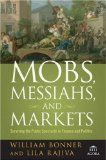
William Bonner and Lila Rajiva, Mobs, Messiahs, and Markets (Wiley, 2007), $17.61. Bonner is either the most frustrating or most entertaining non-fiction writer I've ran across lately. He loves anecdotes and detours. He loves making a larger point by illustrating with an even larger story. At times, I want to scream, "Get to the point!" At other times, I'm saying, "Take your time. This is great." I have finished the book, but I can't say I read every page. I think it was C.S. Lewis who said that people have an unfortunate tendency to think they have to read every page of a book in order to read a book. I've taken his words to heart, especially with this one. I reached the end of the nearly 400 pages, but I jumped like the American navy around Japanese islands toward the end of the WWII. I missed at least 75 pages, but the ones I read were worth storming.
Total Pages of Text: 389. My Progress: Finished. Final Rating: 6.5. Index: B-. Bibliography: None. Footnotes: Acceptable (at end of the book).
__________

Peter Schiff, The Little Book of Bull Moves in Bear Markets (Wiley, 2008), $13.57. I wasn't even sure I should "review" this book. If you've been reading TDE for the past four months, you know my opinion: It's a 10. Schiff applies the abstract principles of Austrian economics to the tangible issue of where to put your money. I'd been reading (and agreeing with) Austrians off-and-on for decades, but only had a vague sense of how their ideas affected my money. Not anymore. If you think von Mises, Hayek and Rothbard understood economics but not sure what it means for you, read Schiff. Also highly recommended: Crash Proof.
__________
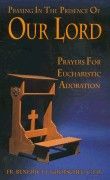
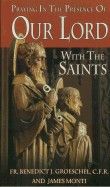
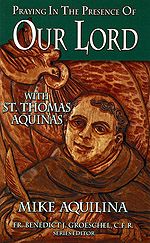
This is a series from Our Sunday Visitor. I have five of them (the three pictured here, plus the one about Mother Teresa and one about Dorothy Day, which are different than the others, but might be my favorites). The first book in the series is the blue volume by Fr. Groeschel, but he then followed it up with the saint volume (the brown one), which I like more than the first book. The volumes are geared for use in church; specifically, for time in front of the tabernacle or for Eucharistic adoration. I try to keep one in my car at all times, just in case I stop off in a church during the day. They're also great for prayer right before and after communion.
I'm skeptically impressed that most Catholics don't need a book aid before or after communion (then again, if they're belting out the 27+ verses to Whatsoever You Do, they're praying twice! . . . it's a metaphysical fact, right?). If I don't use a book, my mind almost always wanders. I'm in good company, though. St. Theresa Avila said she feared approaching prayer without a book. I'm in her camp: start with a book, and if unaided prayer takes over, put the book down. These books are excellent prayer starting points. Highly recommended.
I can't give my normal assortment of statistics (number of pages, index, etc.). I give the books a "9" overall.

In Conversation with God, Francis Fernandez, $129.65. This is a flat-out classic. I bought it on Fr. Corapi's recommendation. It's the best meditation and practical spiritual guide I've ever read, and I've read many. Daily meditations (six or so short-ish pages) crafted around the day's scripture readings. It's geared to Catholics, but Orthodox would find most of it (say, 90%) helpful, and Protestants, depending on the denomination, would find the bulk of it (say, 75%) useful (there are a few lessons dedicated to Mary, praying with the saints, the importance of the papacy, but most of the lessons are simply about following Christ in ordinary, daily life). I've been reading it off-and-on for a year with great benefit. I suspect I'll be reading it the rest of my life.
Total Pages of Text: Seven volumes, each of which fit in my pocket. My Progress: Read a chunk from each volume. Current Rating: 10. Index: A- (you wouldn't expect an index in these types of books, but they have good ones). Bibliography and Footnotes: None.
__________
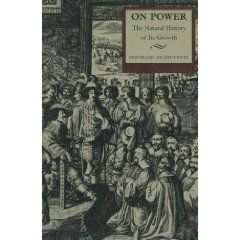
On Power, Bertrand de Jouvenel, 1945, $10.80. A modern day political philosophy classic that makes this undeniable point: Power, left to itself, is a one-way ratchet. Indispensable reading as we prepare for an ambitious first 100 days.
It's a somewhat difficult book, but I plodded through it, putting it down repeatedly to think and make notes, like this one:
[Power] is a thing with a distinct identity and its own interests and pursuits: it's a living thing that preserves itself, seeks to better itself, seeks to enlarge itself.
It's an entity, and it doesn't matter if it was put into existence by Dr. Frankenstein or a million voters. Once it gets put into existence, it starts to grow.
Just as power in the soul of individuals turns us all into metaphysically two-hearted persons--possessing a heart of love and a heart for power–the soul of governmental power bifurcates the state into a composite creature of altruism and power: the altruism is what makes its handlers think they're using power to do good (all people seek to do what they think is good, even if it's in reality evil), like Tolkien's Boromir thinking he would bring goodness out of Sauron's Ring of Power.
But the altruism always increases the Power. The state cannot undertake any action unless it has the Power, so when Power's handler says it wants to do something for the good of the people, it might be sincere, but it's also feeding itself at the same time, like the swooning and penetratingly-serious young man who swears to his girlfriend that he loves her and merely wants to show her how much . . . if she'll just submit a little bit of herself to his lascivious control.
style="float: left; padding-right: 10px;"
__________
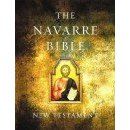
The Navarre Bible - New Testament Expanded Edition, 2008, $79.95. Received for Christmas. I've barely scratched into its pages yet, but I already know this: it's perfect. I'd been looking for a good Catholic Bible study for years. I bought one for the Book of John. Its "insight" consisted of asking a bunch of questions. I started Scott Hahn's books. Excellent, but isolated paperbacks didn't allow for cross-referencing. I glanced at other study guides, but they looked inadequate. Then I stumbled across this re-issuance and expansion of a Biblical mainstay. Great stuff, I'm keeping it on my desk at all times: interpretation, explanation, quotes from the mystics who contemplated these words at a deeper level than I ever will.
Great find. Greatly recommended.
Total Pages of Text: 1,027. My Progress: Finished (just kidding). Final Rating: 10. Index: A-. Bibliography: Good. Footnotes: Best ever (at bottom of each page).

The Essential Rothbard, David Gordon, 2007, $19.00. Rothbard almost made me an anarchist. I read some of his stuff and delved into various areas of anarchist thought (mostly through this this somewhat difficult, very thick, often fascinating volume). I've abandoned such notions, but my six-month foray was worth it. The anarchists make you ask questions that every person concerned about things public (the republic) should ask: What is the origin of government? How exactly do wars happen? How can a country surrender in a war if it has no government? If the State exists by violence--actual or the threat of--does that tend to make society more violent? I've come to view Rothbard as a great economist, a good historian, and an amateur but unique philosopher. He has his flaws (watch for false dichotomies), but he raises questions that the American people ought to ask a lot more frequently. Gordon's volume is a great place to start.
Total Pages of Text: 124. My Progress: Finished. Final Rating: 8. Index: A-. Bibliography: 53-page listing of Rothbard works, but nothing else. Footnotes: Very good (and at bottom of pages).
__________
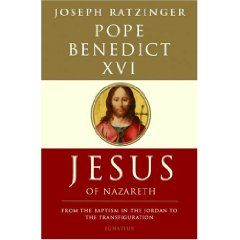
Jesus of Nazareth, Pope Benedict XVI, 2007, $10.17. I've always said Catholicism is the easiest or most difficult religion around. You can be a peasant lady who attends says the (entire, all 15-decades) Rosary daily, who has never heard of "transubstantiation v. consubstantiation," and assumes the U.S. Constitution was written in Latin. She's probably very wise, but very simple. If you don't want to be that happy and content peasant lady (and what good red-blooded American does?) and prefer to think on your own, regardless of your innate limitations, then you better be ready to buckle down. And if you want to buckle down, this volume is a good piece of exercise.
Benedict Groeschel repeatedly praises this volume. I've struggled a bit (I bought it six months ago), but I will get through it.
Note to my Protestant readers: If you don't think Catholics have a "personal relationship with Jesus," please ponder this volume.
Total Pages of Text: 357. My Progress: Page 128. My Current Rating: 10, of course (if written by anybody else: 6). Index: F (none). Bibliography: Decent. Footnotes: None. Contains a glossary.
__________
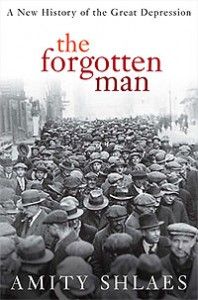
The Forgotten Man: A New History of the Great Depression, Amity Shlaes, 2007, $9.57. Shows how the prideful Hoover bungled the Panic of 1929, not by doing nothing, but by doing something. Also shows the leftist beginnings of The New Deal and how it prolonged The Great Depression. My hunch: "must reading" as another progressive administration prepares to wrestle with a big economic downturn.
Total Pages of Text: 383. My Progress: Page 223. My Current Rating: 8. Index: A-. Bibliography: Excellent. Footnotes: None.
__________
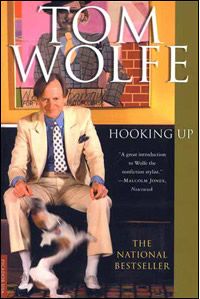
Hooking Up, Tom Wolfe, 2000. Already feels dated, but still entertaining and erudite. The fiction writer Wolfe is also one of our great essayists. He could compete with Joseph Epstein, though he lacks Epstein's ability to pummel a person with literary anecdotes and waves of facts. Good beach reading for the non-fiction reader that wants something light. Used copies available cheap.
Total Pages of Text: 293. My Progress: Page 140. My Current Rating: 6. Index: None. Bibliography: None. Footnotes: None.
______________________________________________
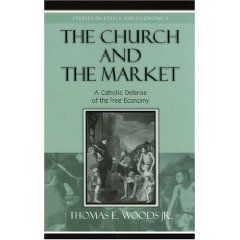
The Church and the Market, Thomas E. Woods, 2005. Great economics primer for budding free market Catholics. A bit scathing toward my beloved Distributists, but criticism not unfair. There's more common ground between the two than Woods lets on (in particular, a deep suspicion--backed by many historical facts--that big business and big government scratch each others' backs, to the detriment of everyone else).
Total Pages of Text: 218. My Progress: Finished. Final Rating: 9. Index: A-. Bibliography: Excellent. Footnotes: Excellent (bonus: contained at end of chapter, which is far better than at the end of the book, though not as good as at the bottom of the page . . . footnotes).
______________________________________________
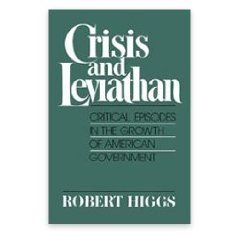
Crisis and Leviathan: Critical Episodes in the Growth of American Government, Robert Higgs, 1987. War is a capitalist tool, said the Marxists. War is a big government tool, says Higgs. I think they're both right to a degree, but Higgs ultimately wins the debate. From "crisis" working conditions at the turn of the century (think Sinclair's Jungle) to poverty in the 1960s, Higgs shows how the Beltway has emphasized emergency and urgency in hopes of expanding Washington's reach. Thick book, packed with facts and notes; it wasn't issued by Oxford University Press because it's light reading.
Total Pages of Text: 262. My Progress: Finished. Final Rating: 10. Index: B+. Bibliography: Excellent. Footnotes: Excellent (end of book).
____________________________
About the Weekly Mini-Review
This is an ever-expanding regular TDE feature. Newer reviews are toward the top. Material added to already-existing reviews are highlighted.
"Total Pages of Text" refers to the book's total pages, less footnotes, bibliography, appendix, and index. "My Progress" refers to the number of pages read so far. "My Current Rating" is based on a scale of 1 to 10; after I finish the book, I will give it a "Final Rating." The "Index" rates the book's index on a grading scale: A to F. I assume the "Bibliography" and "Footnotes" references are self-explantory.
